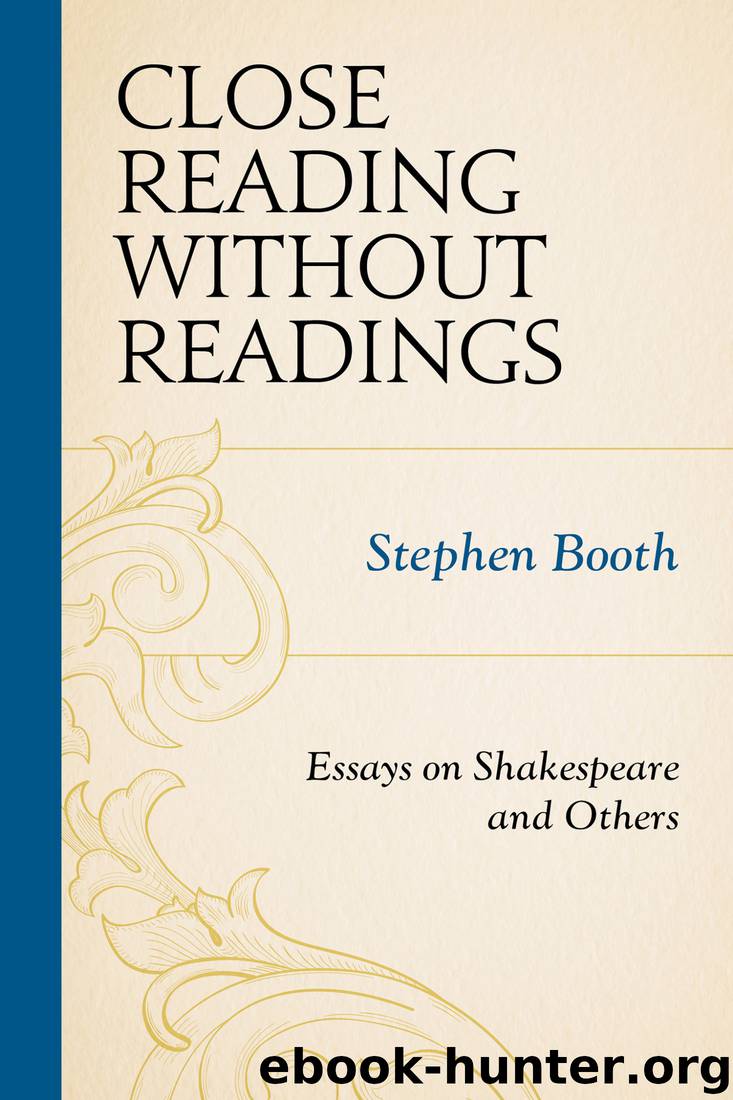Close Reading Without Readings by Booth Stephen

Author:Booth, Stephen [Booth, Stephen]
Language: eng
Format: epub
ISBN: 9781611478907
Publisher: Fairleigh Dickinson University Press
Published: 2015-11-25T15:20:32+00:00
10
Prelapsarian Eroticism
Paradise Lost
Milton is our most libidinous poet. And all readers are our most libidinous readers. In combination, Milton and any reader are thus a serious threat to the decorum that both so highly value. In Paradise Lost, Milton does not often treat his poor, libidinous fallen readers with any more generosity than we deserve. Like drink, Milton—who routinely does more than malt can—provokes desire and unprovokes it. He dismisses lust in lines that evoke it in readers—who, if they are like me, feel silly and puerile, petty, soiled. This passage, Paradise Lost IV.750–75, is classic among many examples (Adam and Eve have just retired for the night):
Hail wedded Love, mysterious Law, true source
Of human offspring, sole propriety,
In Paradise of all things common else.
By thee adulterous lust was driv’n from men
Among the bestial herds to range, by thee
Founded in Reason, Loyal, Just, and Pure,
Relations dear, and all the Charities
Of Father, Son, and Brother first were known.
Far be it, that I should write thee sin or blame,
Or think thee unbefitting holiest place,
Perpetual Fountain of Domestic sweets,
Whose bed is undefil’d and chaste pronounc’t,
Present, or past, as Saints and Patriarchs us’d.
Here Love his golden shafts imploys, here lights
His constant Lamp, and waves his purple wings,
Reigns here and revels; not in the bought smile
Of Harlots, loveless, joyless, unindear’d,
Casual fruition, nor in Court Amours,
Mixt Dance, or wanton Mask, or Midnight Ball,
Or Serenate, which the starv’d Lover sings
To his proud fair, best quitted with disdain.
These lull’d by Nightingales imbracing slept,
And on thir naked limbs the flow’ry roof
Show’rd Roses, which the Morn repair’d. Sleep on
Blest pair . . .1
Probably aroused by contextually pertinent, contextually preposterous sexual suggestiveness in phrases like “unbefitting holiest place,” “Perpetual Fountain,” “golden shafts,” and “constant Lamp”—I feel perverse in my petty prurience and then feel like a voyeur when Milton lets me look down through the roof of Adam and Eve’s bower on their naked limbs. The passage, however, has, but does not acknowledge, a full share in my guilt. It is not entirely my fault that—when Love waves his purple wings at me—I wave back like a harlot.
I am the same low creature at lunch with Raphael in Book Five, when Eve’s nakedness is presented casually in a sentence that gives all of its attention to Eve’s conscientiousness as a hostess; the adjective “naked” is incidental; the sentence behaves as it would if “naked” were only metrical filler. Then, after I have experienced a moment of secret shame, Milton focuses on exactly the detail about which I have just lost perspective.
Meanwhile at Table Eve
Minister’d naked, and thir flowing cups
With pleasant liquors crown’d: O innocence
Deserving Paradise! if ever, then,
Then had the Sons of God excuse to have been
Enamour’d at that sight; but in those hearts
Love unlibidinous reign’d . . . (V.443–49)
(By the way, to someone who has not read Paradise Lost, this paper could seem sexist—or, anyway, one that confidently and foolishly assumes that its audience’s sexual preferences are those of its author. I would once have thought so too. As
Download
This site does not store any files on its server. We only index and link to content provided by other sites. Please contact the content providers to delete copyright contents if any and email us, we'll remove relevant links or contents immediately.
| African | Asian |
| Australian & Oceanian | Canadian |
| Caribbean & Latin American | European |
| Jewish | Middle Eastern |
| Russian | United States |
4 3 2 1: A Novel by Paul Auster(12392)
The handmaid's tale by Margaret Atwood(7763)
Giovanni's Room by James Baldwin(7346)
Asking the Right Questions: A Guide to Critical Thinking by M. Neil Browne & Stuart M. Keeley(5775)
Big Magic: Creative Living Beyond Fear by Elizabeth Gilbert(5771)
Ego Is the Enemy by Ryan Holiday(5448)
The Body: A Guide for Occupants by Bill Bryson(5096)
On Writing A Memoir of the Craft by Stephen King(4943)
Ken Follett - World without end by Ken Follett(4731)
Adulting by Kelly Williams Brown(4574)
Bluets by Maggie Nelson(4556)
Eat That Frog! by Brian Tracy(4540)
Guilty Pleasures by Laurell K Hamilton(4449)
The Poetry of Pablo Neruda by Pablo Neruda(4106)
Alive: The Story of the Andes Survivors by Piers Paul Read(4031)
White Noise - A Novel by Don DeLillo(4009)
Fingerprints of the Gods by Graham Hancock(4004)
The Book of Joy by Dalai Lama(3986)
The Bookshop by Penelope Fitzgerald(3853)
